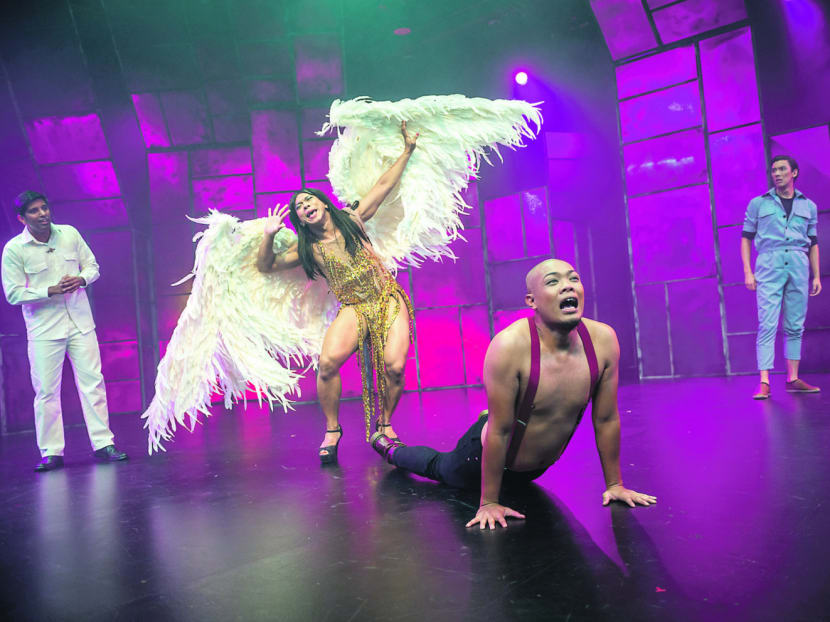The Lady of Soul gets her groove on
SINGAPORE — This weekend marks the end of what has been a very special edition of The Esplanade’s Studios season. One that didn’t feature the primarily experimental and avant-garde productions the series is known for but, instead, went back in time to revisit Singapore’s theatre canon — 50 plays in all, in the form of dramatised readings and five full productions.

Tan Tarn How's The Lady Of Soul And Her Ultimate "S" Machine gets its groove on. Photo: Tuckys Photography.
SINGAPORE — This weekend marks the end of what has been a very special edition of The Esplanade’s Studios season. One that didn’t feature the primarily experimental and avant-garde productions the series is known for but, instead, went back in time to revisit Singapore’s theatre canon — 50 plays in all, in the form of dramatised readings and five full productions.
Of the latter, audiences entered the world of the upper class in two monologues (Emily Of Emerald Hill and The Weight Of Silk On Skin), explored the periphery of society via the lives of the mentally ill (Off Centre), got thrown for a loop with a post-modern take on history (Descendants Of The Eunuch Admiral) before finally ending their trip with a political play that initially struggled to be seen two decades ago.
It took playwright Tan Tarn How two years before The Lady Of Soul And Her Ultimate “S” Machine finally saw the light of day in 1993, having encountered difficulties in getting a performance licence because of its supposedly questionable content and views. And, indeed, the play asks big questions.
We follow civil servant Derek (Prem John), who’s tasked with coming up with a report on how to create a “vibrant nation”, one with “soul”. He is also a closet homosexual who keeps his relationship with Paul (Crispian Chan), a fellow bureaucrat who tows the line and is reluctant to rock the boat, under wraps. Derek’s encounter with three outrageous, out-of-the-box thinkers — representing progressive, left-leaning ideas, sex and art (rather strangely personified as a skinhead) — makes him to rethink his comfy ways.
In many political plays, timeliness, rather than timelessness, is often the most crucial benchmark. Unless one is content with a historical approach, The Lady Of Soul, interpreted this time by director Zizi Azah partly as a soul music-drenched spectacle, is no different. There are things here that have aged well, even as others have not. Its satirical jabs against civil servants and bureaucracy, with its countless committees a la Matryoshka dolls and smokescreen doublespeak, continue to hit hard. The text’s light-hearted wordplay still has zing and the earnest entreaties feel honest.
But the idea of a nation searching for soul feels a tad simplistic. The dichotomy between having one and not having one too is clear-cut. It may seem tiresome to refer to The Esplanade yet again as a sign of progress from the time The Lady Of Soul was staged (1993 was, of course, a very crazy year for the arts), but we’re talking about more than infrastructure.
The way the play pins its hopes on art (and sex) as magic ingredients can, in this day and age, sound rather romantic. What happens when art itself loses its soul? That’s something that has been on the minds of many critics of hyper-commercialised events such as fairs, auctions, festivals or biennales. (That said, left-leaning ideas, one of Derek’s three alternative “muses”, is once more finding currency in the light of growing disillusionment in the very same market system that has sucked the soul out of the arts.) Even the very idea of a nation’s “soul” may ring a different bell nowadays, when such essentialist notions have been used to fuel exclusionary politics in relation to immigration policies.
What perhaps adds to the jarring feel are the half-baked attempts to update it. The “S” Machine in question — here a kind of portable all-lights, bubbles-blowing contraption of a love den — is compared to an iPad. But its critique of mass media fails to account for how the Internet has had an effect on society (both good and bad). And while namechecking a hardcore punk icon such as Henry Rollins for the “pro-soul” side may be a trifle thing, the fact is that these days, you can see Rollins hosting TV shows on the History Channel.
Yet, The Lady Of Soul, which ends its sold-out run tomorrow, continues to ring true. The very play’s struggles with censorship in the ’90s find resonance in various ways. While events such as Pink Dot flourish, the debates surrounding Section 377A are still around. The campaign for a “vibrant nation” is very much echoed in the policies and events being rolled out: The concerted push for the arts overseas (most recently, with Singapore’s return to the Venice Biennale - and with a new 20-year-lease at that) is very much part of that family tree. Derek’s lines about wanting to build a “different” place as opposed to a “better” place is something you hear more often from civil society groups.
Acting-wise Crispian Chan and Prem John (as Paul and Derek) make for good, stiff bureaucrats but not so much as lovers. And in a cast performance that’s as wacky as it gets, in particular Shafiqhah Efandi as one of the two Vanna White-ish characters and Lian Sutton as the somewhat Maoist engineer, it’s Rizman Putra who brings the house down with his larger-than-life antics as the sex-crazed, winged mama san.








